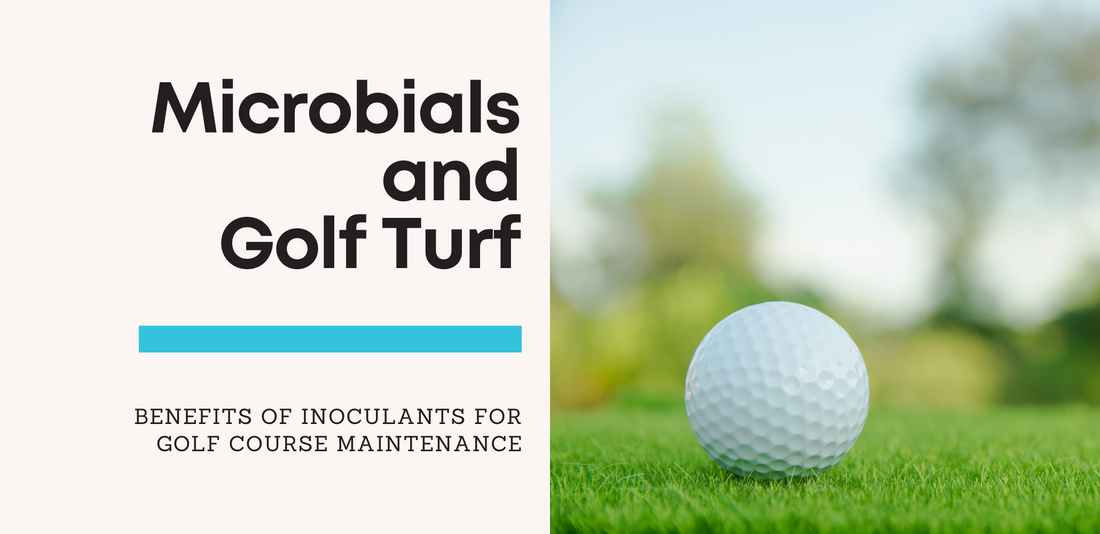
Exploring the Benefits of Microbial Inoculants for Golf Course Maintenance
This blog was moved to the new En-Truf website: https://www.enturf.com/post/exploring-the-benefits-of-microbial-inoculants-for-golf-course-maintenance
By Jessica O’Hanlon, BSc
Golf courses are beautiful landscapes that require a great deal of maintenance to keep them looking pristine. This maintenance relies on a combination of factors and we’ll explore advancements in the field of plant biostimulants and microbial research to improve turf management. This has recently gained attention with the reintroduction of the Plant Biostimulant Act by U.S. representatives on March 15, 2023.
The purpose of this legislation is to expand the research and support the use of biostimulants in agriculture due to the many inherent benefits.
With over 14,000 golf course facilities in the U.S. spanning 2 million acres of land, finding alternatives to traditional fertilizers and pesticides is an important endeavor in agriculture and turf science [1]. There is a need to find solutions to deal with issues such as:
- Rising costs of fertilizer and scarcity of fertilizer inputs
- High reliance on use of pesticides by golf courses (more than 4 times used per acre than on agricultural land [2])
- Pesticide and pathogen resistance
- Employee health risks from prolonged pesticide exposure
Through targeted research, scientists have been able to identify either single or mixed strains of microorganisms that enhance plant growth, increase nutrient uptake, improve soil structure, and protect plants from pathogens through various mechanisms. These strains of microorganisms are produced, added in a formulation and developed into “microbial inoculants” that can be applied to seeds, turf or plants.
What are Microbial Inoculants?
Microbial inoculants are defined as "formulations containing beneficial microorganisms that can be applied to plant or soil to enhance plant growth and health". These microorganisms can be bacteria, fungi, or other types of microbes that can colonize the root system or inside the plant. There are several types of microbial inoculants which can be broken into biostimulants, biofertilizers and biocontrol agents. Research has shown that the use of microbial inoculants can increase crop yields, improve soil health, and reduce the need for synthetic fertilizers and pesticides.
Below are images from a study comparing grass grown with and without the microbial inoculant treatment. The grass sample using the microbial inoculant was significantly higher in biomass and overall health.

Below are photos from the University of California, Riverside Turf Trials, 2022 [6].

Biotic Stress (UC Riverside Anthracnose Trial, 2022)

Abiotic Stress (UC Riverside Salination Trial, 2022)
Why Reduce Traditional Fertilizers and Pesticides on Golf Courses?
Golf courses use a lot of various fertilizers, such as phosphorus and nitrogen to supplement plant growth. These minerals are natural resources and have a limited quantity, such as phosphorus which is expected to be depleted in the next 80 years at current use rates [3]. Fertilizer use can contribute to water pollution through the leaching of excess nutrients into nearby waterways. This can cause harmful algal blooms and other negative impacts on aquatic ecosystems and wildlife. Additionally, the excessive use of fertilizers can lead to soil degradation, which can reduce the long-term productivity and health of the golf course.
The pesticides used on golf courses can be divided into broad categories: herbicides, insecticides and fungicides. Over time, pests & pathogens can become resistant to pesticides, thus turfgrass managers need to continuously update and change their regime [4].
The environmental consequences of using pesticides include soil acidification, eutrophication of water bodies, and the depletion of important nutrients. Additionally, synthetic fertilizers are becoming exponentially expensive and require frequent applications to maintain optimal growth conditions for the turf.
Conclusion
Plant biostimulants can be an environmentally friendly and cost-effective solution to reduce use of traditional fertilizers and pesticides. Modern microbial inoculants can stimulate natural plant processes, leading to increased growth, health, pathogen resistance. They are composed of natural microorganisms that can help improve soil fertility, increase nutrient uptake, and enhance plant resilience to environmental stresses. This makes them an ideal solution for golf courses that need to maintain a delicate balance between pristine turf and environmental sustainability.
Modern golf course management can benefit from science as it is intrinsically connected to complex ecological relationships. As scientific research on soil and turfgrass management expands, new techniques can be incorporated. Plant biostimulants and microbial inoculants are beneficial from a financial, health and environmental standpoint. By exploring these alternative methods of maintaining healthy turf, golf courses can reduce their reliance on pesticides and promote a safer and more sustainable approach to turf management.

Jessica is a Product Scientist at Earth Microbial.
